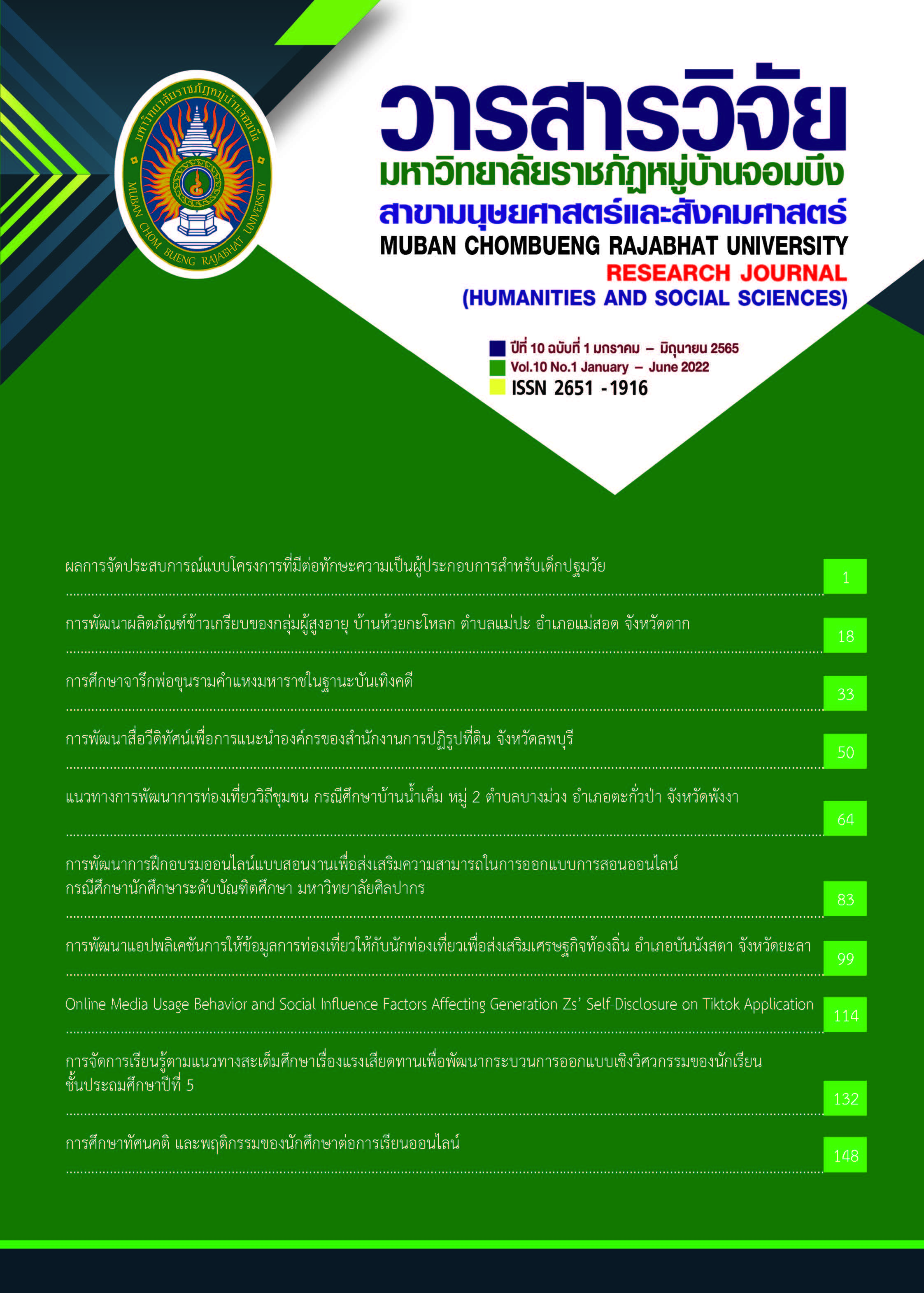Online Media Usage Behavior and Social Influence Factors Affecting Generation Zs’ Self-Disclosure on Tiktok Application
คำสำคัญ:
พฤติกรรมออนไลน์, อิทธิพลทางสังคม, การเปิดเผยตัวตน, ติ๊กต็อกบทคัดย่อ
การใช้สื่อสังคมออนไลน์ก่อให้เกิดผลต่างๆ ต่อชีวิตของผู้คนมากมายในปัจจุบัน วัตถุประสงค์ของงานวิจัยนี้ 1) เพื่อศึกษาการเปิดเผยตัวตนของเจเนอเรชั่นแซดในแอพลิเคชั่นติ๊กต็อก 2) เพื่อศึกษาพฤติกรรมการใช้สื่อออนไลน์ของเจเนอเรชั่นแซด และ 3) เพื่อศึกษาอิทธิพลทางสังคมที่มีผลต่อการเปิดเผยตัวตนเจเนอเรชั่นแซดในแอพลิเคชั่นติ๊กต็อก เป็นการวิจัยเชิงปริมาณโดยใช้แบบสอบถามในการดำเนินการวิจัยในกลุ่มเจนเนอเรชั่นแซดจำนวน 400 ชุด ที่เคยมีประสบการณ์ใช้แอพลิเคชั่นติ๊กต็อก วิเคราะห์ข้อมูลเชิงพรรณนาและการวิเคราะห์ถดถอย ผลการวิจัยพบว่ากลุ่มตัวอย่างมีการเปิดเผยตัวตนในโลกออนไลน์ในระดับสูง โดยเพศ ระดับการศึกษาและอาชีพที่แตกต่างกันมีการเปิดเผยตัวตนไม่แตกต่างกัน และประสบการณ์ในการใช้สื่อออนไลน์ ประสบการณ์ในการใช้แอพลิเคชั่นติ๊กต็อก ระยะเวลาในการใช้แอพลิเคชั่นติ๊กต็อกต่อวันต่อชั่วโมง และปัญหาอุปสรรคของการใช้แอพลิเคชั่นติ๊กต็อกที่แตกต่างกันมีการเปิดเผยตัวตนแตกต่างกัน ผลการวิเคราะห์ถดถอยพบว่าอิทธิพลทางสังคมมีผลต่อการเปิดเผยตัวตน ดังสมการ
Ý = 1.223 + .107(การชักจูงใจ) + .148(การคล้อยตาม) + .210(การยอมทำตาม) + .151(การเชื่อฟัง)
และ Z = .249(การชักจูงใจ) + .281(การคล้อยตาม) + .346(การยอมทำตาม) + .253(การเชื่อฟัง)
เอกสารอ้างอิง
Al-Qeisi, K., & Hegazy, A. (2020). Consumer online behavior: A perspective on Internet banking usage in three Non-Western Countries. Procedia Economics and Finance, 23, 386 – 390. https://doi.org.10.1016/S2212-5671(15)00347-0.
Araphawate. W., Cheewasaton. S., & Dejasawanong. C. (2013). Communication behavior in Facebook of students at Rajamangala University of Technology Phra NaKhon. RMUTP Research Journal 7(2), 120-130. (In Thai). https://doi.org/10.14456/jrmutp.2013.1 (In Thai).
Stopfer, J. M., Egloff, B., Nestler, S., & Back, M. D. (2014). Personality expression and impression formation in online social networks: An integrative approach to understanding the processes of accuracy, impression management and meta‐accuracy. European Journal of Personality, 28(1), 73–94. https://doi.org/10.1002/per.1935
Cheung, C., Lee, Z. W. Y., & Chan, T. K. H. (2015). Self-disclosure in social networking sites: The role of perceived cost, perceived benefits and social influence. Internet Research, 25(2), 279-299. https://doi.org/10.1108/IntR-09-2013-0192
Friedkin, N., & Johnsen, E. (1999). Social influence networks and opinion change. Advances in Group Processes 16(1), 1-28.
Garcia, E. A., Sousa-Filho, J. M., & Boaventur, J. M. (2018). The influence of social disclosure on the relationship between corporate financial performance and corporate social performance. Revista Contabilidade & Finanças, 29(77), 229-245. http://dx.doi.org/10.1590/1808-057x201804950.
Gleebyeesoon, C. (2018). Usage behavior of online media to access consumer aesthetic information. An Independent study [Master’s thesis]. Thammasat University.
Glodenson, R. N. (1984). Dictionary of psychology and psychiatry. New York: Longman.
Goffman, E. (1956). The presentation of self in everyday life. New York: DoubledayAnchor.
Guadagno, R. E., & Cialdini, R. B. (2019). Online persuasion and compliance: Social influence on the internet and beyond, Chapter 4. New York: Oxford University Press.
Kim, H., & Papacharissi, Z. (2003). Cross‐cultural differences in online self‐presentation: A content analysis of personal Korean and US home pages. Asian Journal of Communication 13(1), 100-119. http://dx.doi.org/10.1080/01292980309364833.
Kaewwit., R. (2007). Factors Influencing the Internet Using Behavior of Undergraduate Students in Bangkok and Suburban Areas. https://www.bu.ac.th/knowledgecenter
/epaper/jan_june2007/Raweewan.pdf
Krishnan, A., & Atkin, D. (2014). Individual differences in social networking site users: The interplay between antecedents and consequential effect on level of activity. Computers in Human Behavior, 40, 111–118. http://dx.doi.org/10.1016/j.chb.2014.07.045.
Podsakoff, P. M., Mackenzie, S. C., Lee, J., & Podsakoff, N. P. (2003). Common method biases in behavioral research: A critical review of the literature and recommended remedies. Journal of Applied Psychology 88(5), 879-903. http://dx.doi.org/10.1037/0021-9010.88.5.879.
Sarawanawong K., Fyeted. K., & Chantrdee. W. (2017). Online Social Media Usage Behaviors of Undergraduate Students, Kasetsart University. Journal of Library and Information Science, Srinakharinwirot University, 10(2), 16-31. (In Thai)
Seemiller, C., & Grace, M. (2016). Generation Z goes to college. San Francisco, CA: Jossey–Bass.
Senkaew, K. (2017). Social Network usage behaviors of X Generation in Bangkok [Master’s thesis]. Bangkok University.
Sutin, T. (2008). Social psychology. Nakhonsrithammarat: Walailak University. (In Thai).
Sprecher, S., Treger, S., & Wondra, J. D. (2013). Effects of self-disclosure role on liking, closeness, and other impressions in get-acquainted interactions. Journal of Social and Personal Relationship, 30(4), 497-514. https://doi.org/10.1177/0265407512459033
Thanasirangkul. K. (2016). Net idolization and its influence on behavior of the youth. Independent study. [Master’s thesis]. Thammasat University.
Vanichbuncha. K. (2007). Statistical analysis: Statistics for management and research (10th ed.). Bangkok: Chulalongkorn University Press.
Venkatesh, V., Morris, M. G., Davis, G. B., & Davis, F. D. (2003). User acceptance of information technology: Toward a unified view. MIS Quarterly, 27(3), 425-478.
Wuttaphan, N. (2018, Nov 29-30). Diversity Management: When Generation Z comes to the Workplace and How Human Resources Can manage?. [Conference session]. The 7th Business, Economics and Communications International Conference 2018, Naresuan University, 51-59. https://www.nu.ac.th/?tribe_events=the-7th-business-economics-and-communications-international-conference-the-7th-becic
Wuthaphan, N., Suksomboonwong, S. (2019, Aug 6-7). Social media behavior with employees working at Phisanulok Municipal Office. [Conference session]. The 11th National Academics Conference, Nakhon Ratchasima Rajabhat University, 667-684. https://rdi.nrru.ac.th/rdi/rdi_office/index.php?page=page&page_id=0
Poomjan. P., Hongliam. N., & Odompet. P. (2015). Online social media usage behaviors of preclinical medical students of Faculty of Medicine Siriraj Hospital. Siriraj Medical Bulletin, 8(1), 27-35. (In Thai).
ดาวน์โหลด
เผยแพร่แล้ว
รูปแบบการอ้างอิง
ฉบับ
ประเภทบทความ
สัญญาอนุญาต
ลิขสิทธิ์ (c) 2022 วารสารวิจัยมหาวิทยาลัยราชภัฏหมู่บ้านจอมบึง สาขามนุษยศาสตร์และสังคมศาสตร์

อนุญาตภายใต้เงื่อนไข Creative Commons Attribution-NonCommercial-NoDerivatives 4.0 International License.
วารสาร TCI อยู่ภายใต้การอนุญาต Creative Commons Attribution-NonCommercial-NoDerivatives 4.0 International (CC BY-NC-ND 4.0) เว้นแต่จะรุบุไว้เป็นอย่างอื่นโปรดอ่านหน้านโยบายของเราสำหรับข้อมูลเพิ่มเติมเกี่ยวกับการเช้าถึงแบบเปิด ลิขสิทธิ์ และการอนุญาต



